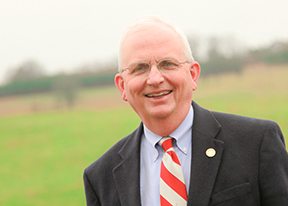
U. S. Environmental Protection Agency Administrator Andrew Wheeler announced the appointment of 12 new members to the Local Government Advisory Committee (LGAC) on Tuesday.
The 31-member LGAC provides advice to EPA on developing stronger partnerships with local governments and building their capacity to deliver environmental services and programs. The Administrator also appointed five new members to the LGAC’s Small Communities Advisory Subcommittee.
Among those named is Georgia Commissioner of Agriculture Gary Black.
“Ensuring the agency is well informed on how its programs impact local governments is an essential part of our decision making process,” said EPA Administrator Andrew Wheeler. “I want to thank our 12 new LGAC members, and five new Small Communities Advisory Committee (SCAS) members, for their willingness to serve in this important role. I also want to thank the returning LGAC and SCAS members for their contributions. The committees provide invaluable insight on how to best work with our local partners to build and maintain strong environmental programs, and I look forward to working with them in the coming year.”
The Administrator also appointed Commissioner Kitty Barnes of Catawba County, North Carolina as the LGAC’s new chair.
“I am honored to be appointed Chair of the Committee and look forward to working with Administrator Wheeler on issues of importance to us at the local level,” said Commissioner Barnes. “As elected and appointed officials of states, tribes, and local governments, we bring firsthand experience from the communities we represent.”
Kitty Barnes has served 21 years on the Catawba County Board of Commissioners, and 12 years as its Chair. She has led the county to the top ranking in North Carolina for curbside single‐stream recycling and biannual household hazardous waste collections. Commissioner Barnes also serves as vice‐chair of the National Association of Counties’ Environment, Energy, and Land Use Steering Committee and Resilient Counties Task Force.
The newly appointment LGAC members include:
The Honorable Gary Ward Black, Commissioner of Agriculture, State of Georgia
The Honorable Bruce Bracker, Supervisor, Santa Cruz County, AZ
The Honorable Melissa Cribbins, Commissioner, Coos County, OR
The Honorable Eric Genrich, Mayor, Green Bay, WI
The Honorable Evan Paul Hansen, House Delegate, State of West Virginia
The Honorable Ryan E. MacKenzie, State Representative, House 134th District, Harrisburg, PA
The Honorable Bill McMurray, Mayor, St. Joseph, MO
The Honorable Steve Miller, Mayor, Fairfield, OH
The Honorable Cynthia Pratt, Deputy Mayor, Lacey, WA
The Honorable Matt Surrency, Mayor, Hawthorne, FL
The Honorable Paul TenHaken, Mayor, Sioux Falls, SD
The Honorable Eric Thompson, Tehoroniathe (Bright Sky), Chief, St. Regis Mohawk Nation, NY
The five new appointments to the LGAC Small Communities Advisory Subcommittee include:
The Honorable Vincent DeSantis, Esq., Mayor, Gloversville, NY
The Honorable Ella M. Jones, City Council Member, Ferguson, MO
The Honorable Joan Lee, Commissioner, Polk County, MN
The Honorable Gabriel Lopez, Vice-Chair, AK-Chin Indian Community, AZ
The Honorable Ann Mallek, Commissioner, Albemarle County, VA
Chartered in 1993 under the Federal Advisory Committee Act, the Local Government Advisory Committee provides independent and objective policy advice to the EPA Administrator on a broad range of issue affecting local governments, such as: regulatory innovation and reform, environmental protection tools, pollution prevention, performance measures, and coordinated environmental management and stewardship. The Small Community Advisory Subcommittee was established by EPA in 1996 to advise the Administrator on environmental issues of concern to the residents of smaller communities. New committee members were selected based on their demonstrated leadership experience, proven record of service to their communities, and involvement in effective environmental protection services and programs at the community, state, and national level.
The committees intend to convene in early 2020 to begin their work.


Chattooga Schools
Berry Professor Publishes Original Short Story Collection

Chattooga Public Safety
Most Recent Chattooga County Food Service Inspections

Chattooga Schools
GNTC names 2026 GOAL, Rick Perkins Award winners

Chattooga Local News
When Summerville Needed Him, Kevin Godfrey Showed Up — Again

Bulloch Public Safety
01/20/2026 Booking Report for Bulloch County

Bulloch Public Safety
01/12/2026 Booking Report for Bulloch County

Bulloch Public Safety
01/09/2026 Booking Report for Bulloch County

Bulloch Public Safety
01/26/2026 Booking Report for Bulloch County

Bulloch Public Safety
01/05/2026 Booking Report for Bulloch County





